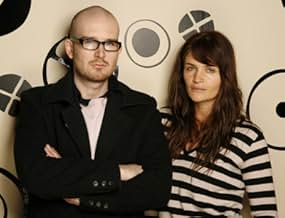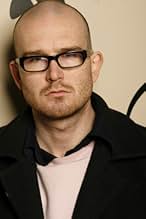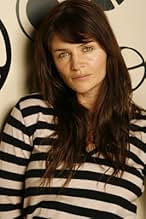Famous pianist Zetterström returns home to his native Denmark, to give a concert, just to find out that the choices he has made in his life have affected his love life greatly.Famous pianist Zetterström returns home to his native Denmark, to give a concert, just to find out that the choices he has made in his life have affected his love life greatly.Famous pianist Zetterström returns home to his native Denmark, to give a concert, just to find out that the choices he has made in his life have affected his love life greatly.
- Director
- Writers
- Stars
- Awards
- 1 win & 6 nominations total
Peder Thomas Pedersen
- Guard 1
- (as Peder Pedersen)
Susanne Storm
- Mor Til Dreng
- (as Susanne Storme)
- Director
- Writers
- All cast & crew
- Production, box office & more at IMDbPro
Featured reviews
Inspired by having seen the provocative Reconstruction last year, I watched Allegro last night and found it to be just spectacular. I think Boe is one of those amazing Renaissance people, whose skills crossover like blossoming fireworks.Above all else, I appreciate his concepts, which become his story lines.Supporting them is his very idiosyncratic visual style. The film is dark and moody, like its protagonist, and there is little dialogue. Long contemplative shots are frequently interrupted by a barrage of split-second images- the equivalent of memory flash cards. The cartoon story that plays during the film's introduction- tells the simple story one is about to see unfold. It's basically a one sentence story about the necessary role that deep feelings play in the life of any great artist. I see that simple story as a spider, and the ensuing film as the web around the spider. I particularly like it that the narrator clearly tells us, at the very beginning, what the film is about, and then we spend the next hours watching that spider web be built and travelled. What a fascinating world Boe creates.
I must say I am very surprised to have not seen much IMDb discussion of this film . I only hope that many more people will soon have the pleasure of its experience.
I must say I am very surprised to have not seen much IMDb discussion of this film . I only hope that many more people will soon have the pleasure of its experience.
The Danish film, "Allegro," is that rare science fiction film that uses only the barest minimum of special effects to tell its story (a slight wrinkle in the picture is about as high tech as the filmmakers are willing to go). Instead, the fantasy and surrealism play out almost exclusively in that far more intriguing venue known as the Theater of the Mind.
Zetterstrom (well played by Ulrich Thomsen, who appeared in the excellent "Brothers" a few years back) is a concert pianist who has never been able to find true happiness in his life, even after he's met and formed a relationship with Andrea (Helena Christensen), the supposed woman of his dreams. Zetterstrom may be a brilliant musician, but he suffers from an innate distrust of other people, including those who are nearest and dearest to him. When Andrea decides to up and leave him virtually without warning, Zetterstrom imposes a form of amnesia on himself that effectively wipes out all memory of his life prior to her departure. At the same time - and this is where things really get strange - the section of Copenhagen where he was born and raised undergoes a bizarre transformation, suddenly becoming cut off from the rest of the world by some inexplicable supernatural force. Though no one can physically enter this area - now officially re-named The Zone - Zetterstrom is determined to force his way in, when, after ten years of not being able to recall his past, he begins to suspect that his memories may actually be residing in that mysterious place.
Needless to say, this is not your average science fiction movie, nor is it your average tale of lost love. But by combining these two usually distinct genres into a single story, director and co-writer (with Mikael Wulff) Christopher Boe has come up with a work that is both thought-provoking and haunting in its otherworldly strangeness. Zetterstrom wanders through the maze of this "pseudo" city like one in a trance or a dream, searching for clues to his forgotten past and trying to figure out the identity of the strange woman (Andrea) who flits in and out of the shadows of his imagination.
The message of this strange little parable seems to be that even the most tragic events of our lives make up a crucial part of who we are - and that any effort to dull the pain of those events by tucking them away in a corner far out of reach of our memory only winds up diminishing us as a person in the end. Zetterstrom learns that lesson the hard way, but at least he does learn it. It reflects well on the filmmakers that they've presented their case in as uniquely fanciful and absorbing a way as they have in "Allegro."
Zetterstrom (well played by Ulrich Thomsen, who appeared in the excellent "Brothers" a few years back) is a concert pianist who has never been able to find true happiness in his life, even after he's met and formed a relationship with Andrea (Helena Christensen), the supposed woman of his dreams. Zetterstrom may be a brilliant musician, but he suffers from an innate distrust of other people, including those who are nearest and dearest to him. When Andrea decides to up and leave him virtually without warning, Zetterstrom imposes a form of amnesia on himself that effectively wipes out all memory of his life prior to her departure. At the same time - and this is where things really get strange - the section of Copenhagen where he was born and raised undergoes a bizarre transformation, suddenly becoming cut off from the rest of the world by some inexplicable supernatural force. Though no one can physically enter this area - now officially re-named The Zone - Zetterstrom is determined to force his way in, when, after ten years of not being able to recall his past, he begins to suspect that his memories may actually be residing in that mysterious place.
Needless to say, this is not your average science fiction movie, nor is it your average tale of lost love. But by combining these two usually distinct genres into a single story, director and co-writer (with Mikael Wulff) Christopher Boe has come up with a work that is both thought-provoking and haunting in its otherworldly strangeness. Zetterstrom wanders through the maze of this "pseudo" city like one in a trance or a dream, searching for clues to his forgotten past and trying to figure out the identity of the strange woman (Andrea) who flits in and out of the shadows of his imagination.
The message of this strange little parable seems to be that even the most tragic events of our lives make up a crucial part of who we are - and that any effort to dull the pain of those events by tucking them away in a corner far out of reach of our memory only winds up diminishing us as a person in the end. Zetterstrom learns that lesson the hard way, but at least he does learn it. It reflects well on the filmmakers that they've presented their case in as uniquely fanciful and absorbing a way as they have in "Allegro."
I went out from the cinema crying. The movie, as all movies in my opinion, removes inside you what you let be removed... I am only 28, and yet, this movie reminds me of how many memories I want to hide, forget, just because my life is based on "keep on living, keep on acting as you decided, don't turn back, because this is imperfection". I don't think the movie is excellent, but it has a specific message (art is made of passion and passion is made of each one's history) and it knew how to express it, how to deal with this psychological side each one of us has. Also the music, mainly J.S. Bach, is beautiful. This is the kind of movie that I would call "of the moment", maybe you won't remember it in a few months, but it inspires you and lives with you unconsciously as a psycho therapy does.
There's a fine and potentially powerful sci-fi-as-metaphor idea at the heart of this film: the notion that the painful memories you wish to repress might be actually taken from you and placed somewhere ("The Zone," a la Tarkovsky's Stalker).
The trouble is, the film is not told from the point of view of the protagonist. His emotional journey would have been powerful if the audience had been *asked to share it.* Why can't I remember more than ten years back? What happened ten years ago? What connection, if any, does my memory lapse have with the mysterious region in my former home city called "The Zone"? Who is the woman in this picture: might she be a lover I have somehow forgotten? Unfortunately, while all of these things are puzzling to our hero, the answers have already been spelled out for us, because the story has been told in a linear fashion, and is actually narrated by an omniscient voice who explains everything point-by-point, essentially before it has happened. This greatly reduces the movie's emotional impact: we are now a passive observer rather than an active participant.
It is, in other words, the anti-Memento. I've long been championing the artistic cause of puzzle movies like that one, and Donnie Darko, Eternal Sunshine, and Upstream Color ... because real life is a puzzle that lacks an omniscient narrator. I wish Boe had trusted his audience much more and dared to tell this from the proper POV: that, and better casting of the female lead, would have made this an 8/10. As it is, it is worth seeing more as an argument in favor of more challenging narrative structures.
The trouble is, the film is not told from the point of view of the protagonist. His emotional journey would have been powerful if the audience had been *asked to share it.* Why can't I remember more than ten years back? What happened ten years ago? What connection, if any, does my memory lapse have with the mysterious region in my former home city called "The Zone"? Who is the woman in this picture: might she be a lover I have somehow forgotten? Unfortunately, while all of these things are puzzling to our hero, the answers have already been spelled out for us, because the story has been told in a linear fashion, and is actually narrated by an omniscient voice who explains everything point-by-point, essentially before it has happened. This greatly reduces the movie's emotional impact: we are now a passive observer rather than an active participant.
It is, in other words, the anti-Memento. I've long been championing the artistic cause of puzzle movies like that one, and Donnie Darko, Eternal Sunshine, and Upstream Color ... because real life is a puzzle that lacks an omniscient narrator. I wish Boe had trusted his audience much more and dared to tell this from the proper POV: that, and better casting of the female lead, would have made this an 8/10. As it is, it is worth seeing more as an argument in favor of more challenging narrative structures.
It was a big surprise that I gave this movie. When you think because a photograph is more important than a drawing, in the sense that the picture does capture a moment and freeze-it for all eternity, drawing, photography is made stronger, the film exploits this fact into something dramatically essential to put an omnipotent narrator in the argumentation, which is extremely interesting. Note that does not follow the structure of classical cinema, therefore understanding becomes a challenge, challenge for the viewer who expects to have more elements with which to rebuild those gaps that are present in the argument, leading to an environment discomfort that unfortunately tends to boredom. Ulrich Thomsen's performance manages to articulate a meaning of forgetting how wonderful, considering it's not just forgetfulness, but also, hate, despair and love. In history we find characters that make no sense, that seem to abound, or better yet, seems to be missing something, something like the memories of humans, so variable over time, but strongly tied to the music, which is extremely strong important to understand and feel this film.
Did you know
- Quotes
Zetterstrøm: - But what now... now that I regret?
Tom: - It's a bit late for that, I am afraid.
Zetterstrøm: - So, what do I do now?
Tom: - Well, you can go back to your music, if you want.
- ConnectionsReferenced in iChat mellem Boe og Wulff (2006)
Details
Box office
- Budget
- DKK 10,000,000 (estimated)
- Gross US & Canada
- $7,404
- Opening weekend US & Canada
- $505
- May 13, 2007
- Gross worldwide
- $10,208
- Runtime
- 1h 28m(88 min)
- Color
- Sound mix
- Aspect ratio
- 2.35 : 1
Contribute to this page
Suggest an edit or add missing content






























